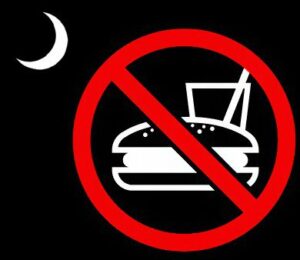Do you find yourself eating mindlessly at night? If so, you’re not alone. Night eating is a common problem that can cause weight gain and other health problems. In this guide, we will discuss the causes of the night eating and offer tips for overcoming it. So, if you’re ready to stop night eating once and for all, keep reading!
Contents
- 1 Why You Should Stop Night Eating?
- 2 How To Stop Night Eating?
- 2.1 Identify your triggers
- 2.2 Create a routine
- 2.3 Drink lots of water
- 2.4 Plan your meal
- 2.5 Avoid trigger foods
- 2.6 Be patient
- 2.7 Make sure you’re eating enough protein
- 2.8 Cut back on simple carbs
- 2.9 Eat mindfully
- 2.10 Get enough sleep
- 2.11 Avoid caffeine and alcohol before bed
- 2.12 Exercise regularly
- 2.13 Manage stress
- 2.14 Make sure your environment is set up for success
- 2.15 Set realistic goals
- 2.16 Seek Emotional Support
- 2.17 Distract yourself
- 3 Conclusion
Why You Should Stop Night Eating?

There are many reasons why people may choose to eat late at night. Some people may be working late and need a quick energy boost, while others may simply be hungry after a long day. However, there are some potential drawbacks to night eating that should be considered before indulging in this behavior.
One of the main effects of late-night eating is that it can disrupt your sleep. If you’re up late eating, your body will have a harder time winding down and falling asleep. This can lead to less restful sleep and may even cause you to wake up feeling tired and groggy.
Late-night eating can also cause weight gain. When you eat late at night, your body has a harder time digesting and metabolizing the food. This can lead to increased calorie intake and weight gain over time.
So, if you’re considering night eating, be sure to weigh the potential risks and benefits before indulging. And if you do decide to eat late at night, be sure to choose healthy, nutritious foods.
How To Stop Night Eating?

If night eating is something you struggle with, know that you’re not alone. Millions of people all over the world deal with this issue daily. Some people are always snacking. Nighttime eating can be a real problem if you’re trying to lose weight or just improve your overall health. If you find yourself raiding the fridge late at night, there are some things you can do to change your habits.
Here are few tips to help stop night eating:
Identify your triggers
What makes you want to eat late at night? Is it boredom, stress, anxiety, or something else? Once you know what’s triggering your night eating, you can start to work on addressing those issues. Issues can be addressed in many different ways, such as through therapy, journaling, or relaxation techniques.
Create a routine
Always follow the routine you have set for yourself. This will help to control night eating. Routine such as working out in the evening or reading a book before bed can help to control night eating.
Eat dinner at a regular time each night and try to avoid eating late at night. If you are hungry after dinner, eat a small healthy snack such as yogurt or fruit. For instance, if your usual bedtime is 11 pm, try to eat dinner no later than 7 pm. This will give your body time to digest the food before you go to sleep.
Drink lots of water
Staying hydrated can help you feel full and prevent cravings. Always aim to drink eight glasses of water a day. If you’re not a fan of plain water, try spicing it up with some lemon or lime slices. You can also drink unsweetened tea or coffee, or sparkling water.
Plan your meal
If you have a plan for your meals, you’re less likely to snack out of boredom or hunger. Try meal planning for the week so you always have something to eat when you get hungry. For instance, you could cook a big batch of chili or soup on the weekends and eat it throughout the week. Or, you could make a healthy wrap or salad to take with you to work for lunch.
Avoid trigger foods
If certain foods tend to make you want to eat late at night, try to avoid them altogether. If you do find yourself snacking at night, make sure you’re choosing healthy options like fruits, vegetables, or nuts.
Be patient
You need to be patient while following this guide. Remember that you didn’t develop these habits overnight, so it will take some time to get rid of them. Always be positive and remind yourself that you can do it!
Make sure you’re eating enough protein
Protein takes longer to digest than other nutrients, so it can help keep you feeling full for longer. It can also help regulate your blood sugar levels, which can prevent cravings and energy crashes.
If you’re not used to eating protein-rich meals, start by adding a source of lean protein to each meal and snack. Good options include grilled chicken or fish, tofu, legumes, eggs, nuts, and seeds. You can also get your fill of protein by drinking protein shakes or eating Greek yogurt.
Cut back on simple carbs
Simple carbs like white bread, pastries, and candy can cause blood sugar spikes and crashes, which can leave you feeling tired and irritable. If you’re trying to stop night eating, cut back on simple carbs during the night and focus on complex carbs like whole grains, vegetables, and fruits.
Eat mindfully
When you’re trying to stop night eating, it’s important to eat mindfully. This means being aware of what you’re eating and how it makes you feel. Pay attention to your hunger cues and only eat when you’re hungry. And, make sure you’re eating slowly and savoring your food. It can take up to 20 minutes for your brain to register that you’re full, so slow down and enjoy your meal.
Get enough sleep
Getting enough sleep is crucial for regulating your hunger hormones. When you’re sleep-deprived, your body produces more ghrelin, a hormone that increases appetite. So, make sure you’re getting seven to eight hours of shut-eye each night.
Avoid caffeine and alcohol before bed
These substances can disrupt your sleep and make it harder to fall asleep. Finally, create a relaxing environment in your bedroom. This means darkening the room, turning off electronics, and using comfortable bedding.
Exercise regularly
Exercise can help reduce stress and promote weight loss, both of which can help stop night eating. Aim to get at least 30 minutes of exercise most days of the week. And, if you can’t fit in a full workout, try taking a brisk walk or doing some yoga before bed. Always do activities which make you feel good like swimming, running or playing your favorite sport.
Manage stress
Stress can trigger night eating, so it’s important to find ways to manage it. If you’re feeling stressed, try taking a few deep breaths or going for a relaxing walk. You can also try journaling or listening to calming music. And, if you have a lot of stress in your life, consider talking to a therapist. They can help you find healthy ways to cope with stress.
Make sure your environment is set up for success
If you want to stop night eating, it’s important to set yourself up for success. This means having a kitchen that’s stocked with healthy foods and making sure your bedroom is dark and quiet. You should also avoid watching TV or working in bed, as this can make you more likely to snack.
Set realistic goals
When you’re trying to stop night eating, it’s important to set realistic goals. This means setting a goal that you can realistically achieve in the short term. For example, instead of saying you’ll never eat at night again, try saying you’ll only eat at night three times a week.
It’s also important to have a plan in place for when you do end up eating at night. This could involve brushing your teeth immediately after eating or drinking a glass of water before bed.
Seek Emotional Support
Night eating can be a way to self-soothe. If you find yourself turning to food for comfort, try to reach out to friends or family members for support. You can also talk to a therapist about your relationship with food.
Distract yourself
If you’re feeling the urge to eat at night, try to distract yourself with something else. Call a friend, watch a movie, or read a book. For instance, if you’re feeling anxious, try taking a bath or listening to calm music. And, if you’re feeling bored, try going for a walk or working on a hobby.
By following these tips, you can stop your night eating. And, if you’re having trouble sleeping, there are a few natural remedies you can try. Drinking chamomile tea before bed can help you relax and get a good night’s sleep. Taking magnesium supplements can also promote restful sleep. And, diffusing lavender essential oil in your bedroom can create a calming atmosphere that’s perfect for sleep.
Conclusion
It may be concluded that night eating is a serious problem that should not be taken lightly. It can lead to weight gain, emotional difficulties, and health problems. If you think you may have a problem with night eating, talk to your doctor or a registered dietitian. They can help you develop a plan to stop night eating and improve your overall health.
For further information and suggestions, please contact Therapy Mantra. We have a team of expert therapists that can help you overcome this problem. Get in touch with us right away to learn more about our services. You may also make an online therapy session or download our free Android or iOS app.


